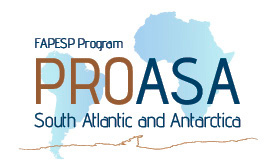PROASA
About the Program

The FAPESP Program for the South Atlantic and Antarctica (PROASA) aims to contribute to the generation, dissemination and application of knowledge, through scientific, technological and innovation approaches, in two interconnected but still little-known planetary compartments (South Atlantic and Antarctica), and which modulate processes that positively and negatively influence the sustainable development potential of the state of São Paulo, Brazil and the world. PROASA therefore considers initiatives aimed at coastal and marine environments in the South Atlantic, under and beyond national jurisdiction, and for Antarctica, which integrates the Antarctic continent and the Southern Ocean (or Southern Ocean).
Mission and Motivation
PROASA's mission is to contribute to the advancement of knowledge about the South Atlantic and Antarctica and its application to confront planetary crises and promote sustainable development. Its vision is to expand, diversify and qualify the leading role of the state of São Paulo and, therefore, the country in the scientific and sustainability agenda of the Ocean, with a focus on the South Atlantic, and Antarctica, promoting transformational scientific, technological and innovation approaches to relevant and emerging themes regionally and globally, in order to contribute to the achievement of the Sustainable Development Goals of the United Nations 2030 Agenda and the expected objectives of the United Nations Decade of Ocean Science for Sustainable Development.
PROASA is motivated to promote advancement in ocean research, especially in the South Atlantic, and Antarctica, which requires additional efforts to overcome the challenges to promoting sustainable development. Brazil is a geopolitical and scientific leader in these regions and must expand this role through financing and strengthening its leadership in strategic interdisciplinary and transdisciplinary research in partnership with other nations.
The state of São Paulo, like other states in Brazil, has internationally recognized institutions and experts in ocean sciences. However, the global influence of national research is still limited, despite the importance of its marine territory. In addition to the generation of new knowledge, the approach focused on society's demands, which largely dialogues with the promotion of technological advances and innovation, still lacks encouragement. Additional effort is also needed to expand access and promote the integration of existing information, consolidating past, ongoing and future initiatives. Despite advances in Brazilian oceanic and Antarctic research, there are still areas that need to be better structured, while others that are already well established need to reframe their approaches to today's scientific and social challenges. These are the challenges that PROASA intends to overcome in dialogue with the scientific community.
